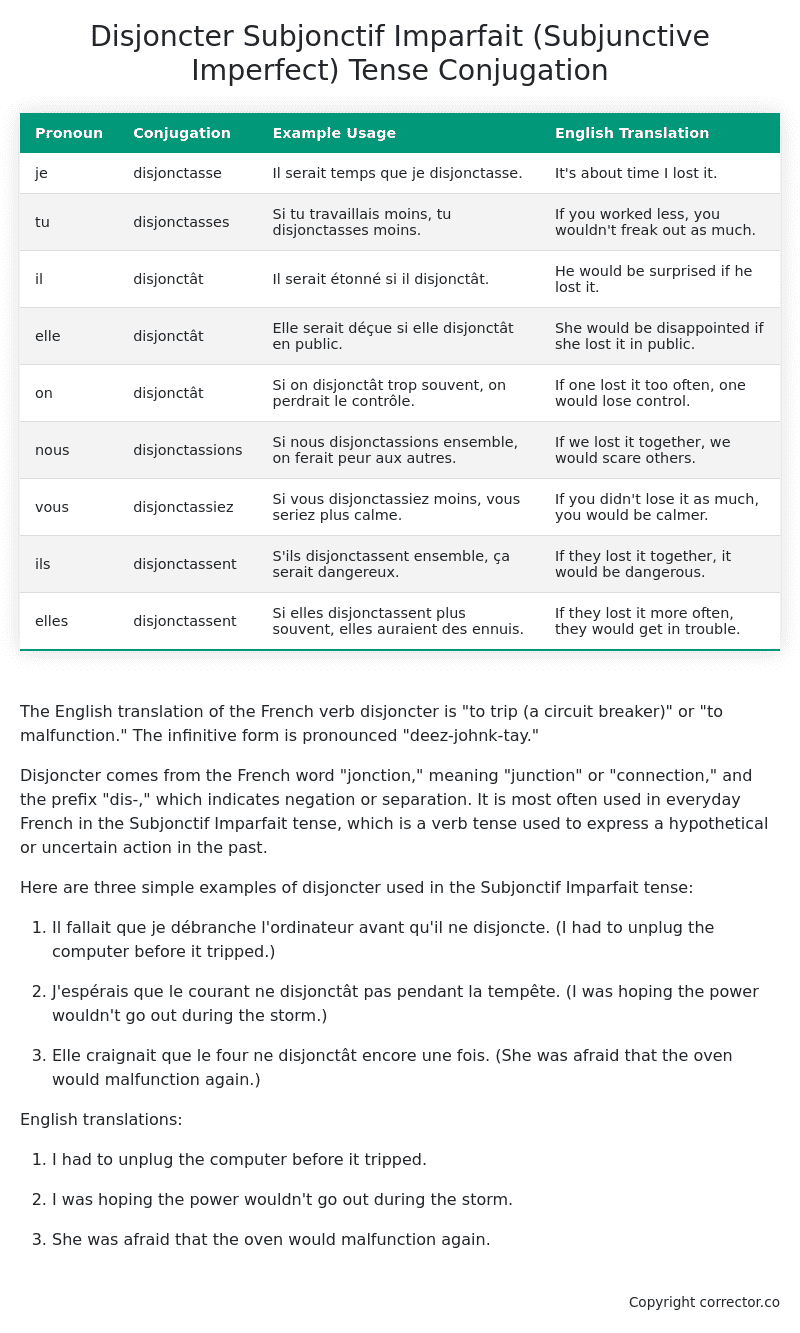Subjonctif Imparfait (Subjunctive Imperfect) Tense Conjugation of the French Verb disjoncter
Introduction to the verb disjoncter
The English translation of the French verb disjoncter is “to trip (a circuit breaker)” or “to malfunction.” The infinitive form is pronounced “deez-johnk-tay.”
Disjoncter comes from the French word “jonction,” meaning “junction” or “connection,” and the prefix “dis-,” which indicates negation or separation. It is most often used in everyday French in the Subjonctif Imparfait tense, which is a verb tense used to express a hypothetical or uncertain action in the past.
Here are three simple examples of disjoncter used in the Subjonctif Imparfait tense:
-
Il fallait que je débranche l’ordinateur avant qu’il ne disjoncte. (I had to unplug the computer before it tripped.)
-
J’espérais que le courant ne disjonctât pas pendant la tempête. (I was hoping the power wouldn’t go out during the storm.)
-
Elle craignait que le four ne disjonctât encore une fois. (She was afraid that the oven would malfunction again.)
English translations:
-
I had to unplug the computer before it tripped.
-
I was hoping the power wouldn’t go out during the storm.
-
She was afraid that the oven would malfunction again.
Table of the Subjonctif Imparfait (Subjunctive Imperfect) Tense Conjugation of disjoncter
| Pronoun | Conjugation | Example Usage | English Translation |
|---|---|---|---|
| je | disjonctasse | Il serait temps que je disjonctasse. | It’s about time I lost it. |
| tu | disjonctasses | Si tu travaillais moins, tu disjonctasses moins. | If you worked less, you wouldn’t freak out as much. |
| il | disjonctât | Il serait étonné si il disjonctât. | He would be surprised if he lost it. |
| elle | disjonctât | Elle serait déçue si elle disjonctât en public. | She would be disappointed if she lost it in public. |
| on | disjonctât | Si on disjonctât trop souvent, on perdrait le contrôle. | If one lost it too often, one would lose control. |
| nous | disjonctassions | Si nous disjonctassions ensemble, on ferait peur aux autres. | If we lost it together, we would scare others. |
| vous | disjonctassiez | Si vous disjonctassiez moins, vous seriez plus calme. | If you didn’t lose it as much, you would be calmer. |
| ils | disjonctassent | S’ils disjonctassent ensemble, ça serait dangereux. | If they lost it together, it would be dangerous. |
| elles | disjonctassent | Si elles disjonctassent plus souvent, elles auraient des ennuis. | If they lost it more often, they would get in trouble. |
Other Conjugations for Disjoncter.
Le Present (Present Tense) Conjugation of the French Verb disjoncter
Imparfait (Imperfect) Tense Conjugation of the French Verb disjoncter
Passé Simple (Simple Past) Tense Conjugation of the French Verb disjoncter
Passé Composé (Present Perfect) Tense Conjugation of the French Verb disjoncter
Futur Simple (Simple Future) Tense Conjugation of the French Verb disjoncter
Futur Proche (Near Future) Tense Conjugation of the French Verb disjoncter
Plus-que-parfait (Pluperfect) Tense Conjugation of the French Verb disjoncter
Passé Antérieur (Past Anterior) Tense Conjugation of the French Verb disjoncter
Futur Antérieur (Future Anterior) Tense Conjugation of the French Verb disjoncter
Subjonctif Présent (Subjunctive Present) Tense Conjugation of the French Verb disjoncter
Subjonctif Passé (Subjunctive Past) Tense Conjugation of the French Verb disjoncter
Subjonctif Imparfait (Subjunctive Imperfect) Tense Conjugation of the French Verb disjoncter (this article)
Subjonctif Plus-que-parfait (Subjunctive Pluperfect) Tense Conjugation of the French Verb disjoncter
Conditionnel Présent (Conditional Present) Tense Conjugation of the French Verb disjoncter
Conditionnel Passé (Conditional Past) Tense Conjugation of the French Verb disjoncter
L’impératif Présent (Imperative Present) Tense Conjugation of the French Verb disjoncter
L’infinitif Présent (Infinitive Present) Tense Conjugation of the French Verb disjoncter
Struggling with French verbs or the language in general? Why not use our free French Grammar Checker – no registration required!
Get a FREE Download Study Sheet of this Conjugation 🔥
Simply right click the image below, click “save image” and get your free reference for the disjoncter Subjonctif Imparfait tense conjugation!

Disjoncter – About the French Subjonctif Imparfait (Subjunctive Imperfect) Tense
Formation
Common Everyday Usage Patterns
Interactions with Other Tenses
Subjonctif Présent
Indicatif Passé Composé
Conditional
Conditional Perfect
Summary
I hope you enjoyed this article on the verb disjoncter. Still in a learning mood? Check out another TOTALLY random French verb conjugation!


